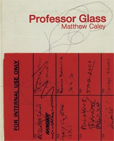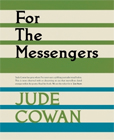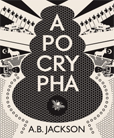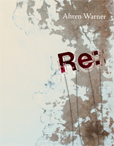
Professor Glass
by Matthew Caley

For The Messengers
by Jude Cowan

Apocrypha
by A.B. Jackson

The Camden Art Redemption Miracle
by Tim Turnbull

Re:
by Ahren Warner
Immaculate Confection:
A Donut Round-Up
With the threat of an e-book-only future looming on the horizon, publishers have been busy reminding us that the printed word can also be an objet d'art. Leading the poetry pack on this front is Donut Press, in some ways the smallest of small publishers, yet somehow managing to bring out beauteous book after beauteous book, fastidiously edited by the sharp eyes of Andy Ching and featuring strong cover designs by Liam Relph that avoid the 'brand template' feel of many contemporary poetry volumes.
Matthew Caley's Professor Glass is swollen with the signposts of academic learning, but the references – which run the full gamut from populist to esoteric – are intentionally starved of meaning and relevance. They are flotsam and jetsam, linguistic detritus either left bobbing in the wake of the central character's self-destructive trajectory, or else all there is and ever was of the titular professor. He is, it is hinted, a kind of Toxic Avenger or Smog Monster – a folk creature for the academic world, birthed from its waste. The poems include an internal memo, a report sheet, fragments of analysis, literary lists and a fractured dialogue, the last demonstrating Caley's supreme light touch when handling outbursts of knowledge:
"Not coral – which by the way is an anagram of Lorca – but corral."
Whenever a reference is used for anything other than textual collage, he gives us the information we need to make fleeting sense of it:
"Kant was right to critique
the pure. Nothing corrupts like the innocent."
High Exit Velocity
There are perhaps too many poems centering around Professor Glass's possibly-imaginary affairs with students, but mostly it's a mixture of the riotous and the eerily beautiful.
From the question of whether Barthes was killed by a milk float to ponderings on a student’s sexual history, Professor Glass is a brilliantly composed scrapbook detailing the breakdown of an academic (or, as the blurb suggests, an idea of an academic) and his social devolution, shedding knowledge in sheaves en route.
The memo that begins this book, discreetly hinting at indiscretions, describes an Orwellian scrubbing clean of records, a cover-up for the good of the establishment, to be fed through the translators in the Press Office. Names are half-erased and witnesses are shipped off to other countries. Reality is already in question when we enter the professor's world.
Caley constructs and deconstructs identity here through linguistic games. The numbing repetition of "Stephen King, Stephen King, Stephen King..." in 'Unpacking Her Library' shifts in meaning with its relentlessness. The ludicrous wall of popular fiction becomes alienating, as Glass realises the scale of the gulf between him and the woman it belongs to. Meanwhile, 'Dialogue in the Wind', with its musing word association and sonic tangents, evokes mental fluctuation and a sense of drifting slowly out to sea.
Or perhaps simply "down to the laguna/to watch the rot set in".
For The Messengers by Jude Cowan represents a new breed of poetry-journalism. Sifted from the thousands of reams of news footage that passed through her hands every day for a year, this collection re-imagines the major global stories of 2008 as carefully edited vignettes, freeze-framing details that still-photography misses and rolling reports barrel past –
"He rides in circles over the cobbles,
his tyres bouncing vivaciously
up and down on Winter Palace Square."
Russia: Bicycle Protest
– and sometimes even reflecting on the business of news itself, in the way tabloids are so keen to avoid:
"Most of it is okay to show on our website
but we must tag images of boys
sitting 'round in wet soot
as Children Identifiable."
Iraq: Shotlisting
Each poem title is helpfully prefaced with the country to which the story relates. This might seem rather too well-mannered, but it's an important part of the book's hybridised quality. Cowan eschews the radical diversion, the volta and various other poetic 'tricks', instead playing the correspondent whose rapid delivery of information must remain untainted by rhetorical flourish. But she does use form, if sparingly, as well as quote and collage, and she will slyly slip a poet's sense of irony in towards the end of a sequence of images. Not as cold and clear, then, as it could have been, neither warm and sentimental, but a delicate balancing act that mostly pays off.
A channel-hopping spree through over 80 news reports, Jude Cowan's For The Messengers grabs moments from each, creating micro-reports within them; a zoom in on a face or fragment. Then on we go, past Obama, a Japanese belly contest, Josef Fritzl, each one tilted and reworked, using lists, catalogue entries and subtle repetition to winkle out the people behind the headlines.
The backbone of this collection lies in the shrewd selection of materials. With access to reams of information at Thomson Reuters, it's a tribute to Cowan's archiving skills that she picked such a rich range of topics to write on, and that they fit so well together within the collection.
In contrast to Cowan's free-flowing, part-improvised musical style, her poetry is exceptionally controlled and toned. Sharp canapes or shots, these moments feel distilled to glean the essence of the story in each case. While sometimes the satire is a little too heavy handed (the Egyptian survey response, "you ask for it, with your provocative sexy clothes"), the detail is left to do the exposition in most cases ("behind barbs, drying trousers on the wire" in 'Ukraine / Hungary: Border'), unfurling like a drop of ink in a glass of water.
All of Donut's books are supremely high quality but Apocrypha might just be their crowning glory. A stitched (not stapled) pamphlet with a stunningly designed dust jacket, it's 23 pages of poetry publishing perfection that will make everything you ever read on current generation Kindles look thoughtless and shabby.
A.B. Jackson's spare, deadpan sonnets are an integral part of this achievement, not just the socks in an exquisite leather suitcase. Each is divided into four stanzas of three short lines with a two line envoi, and revisits Biblical characters in contemporary variations on their stories, with mischievous footnotes and absurdist side-tracks added for good measure. The number of images and objects packed into every poem should, by rights, see them sinking into tangled lists and itineraries, but instead stack up neatly, like the accumulated details of a joke. "Balding, young Noah" attempts to save his hair with "pigeon dung past, / pomades of hippopotamus fat, / black Andalusian foal urine", building to the punchline of his ark reimagined as a floating "beauty empire", while Gethsemane is awash with prize daffodils, special forces and "odd bits of mown flesh". Very smart, winningly cheeky and satisfying in its quirky symmetry.
Apocrypha is the exception to a rule I’ve previously attempted to chisel into ye reviewing tablet: thou shalt coax in the buyer/reader with a kickass blurb. Instead, Donut seduce the curious with a mute, yet telling, cover, a butter-and-coal inkblot test of gasmasks, bees, beasts, patterns and religious symbols that crooks a beckoning finger.
Inside, Jackson uproots biblical and literary characters and revels in their confusion in the face of modern development. We see Abraham’s watering can making a jungle of Arndale shopping centre and "Moses, in a marmalade wig", readying a gun in fury, the freshly-minted law warping and distorting in his "rosy-raw" hands, set against modern deities and myths. Relevance and identity are thrown into flux, each poem prodding and turning over ideas of 'safe seats' within power structures and the canon. When "the risen Elvis / rolls away his rhinestone", it’s clear that major changes are afoot.
Sown with diabolical possibilities, in-jokes and nips of sharp phrase, where Gethsemane is “a grassy knoll” and Lazarus a "bed-head", Apocrypha is a remarkable book. A curiosity and pleasure in wordplay, coupled with light, deft editing, makes for a fresh, intelligent and outright insolent nod to storytelling through the ages.
Just to round off this overview, The Camden Art Redemption Miracle by Tim Turnbull sees the Yorkshire poet in great form – mordantly funny, rude and rollicking, his command of strict form defiantly off-setting his quotidian turn of phrase. However, what we have here is a single long poem in limited edition, packaged up with a (striking) screen-printed cover, and hence one for collectors. Those new to Turnbull's work should start with 2005's Stranded in Sub-Atomica or 2009's Caligula on Ice and Other Poems.
Forward Prize-nominated wunderkind Ahren Warner already has a full collection out through Bloodaxe, his work having been feted by both Poetry Review editor Fiona Sampson and Salt/Bloodaxe generational anthologer Roddy Lumsden. But if you feel you need to dip a toe in first, his Donut pocketbook Re. is the best place to start. Personally, I still feel mostly cool towards his style, which mixes bursts of philosophical musing (rarely concealing his academic erudition – expect Greek letters and Nietzsche) with a sort of townie swagger. It seems almost like a formula to alienate one type of reader while stroking the ego of another, and as I'm probably a little of both, I don't really know what to feel.









